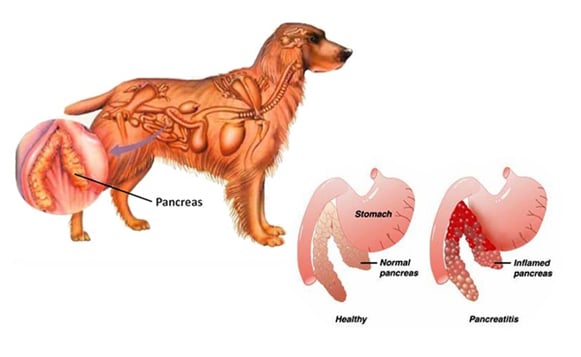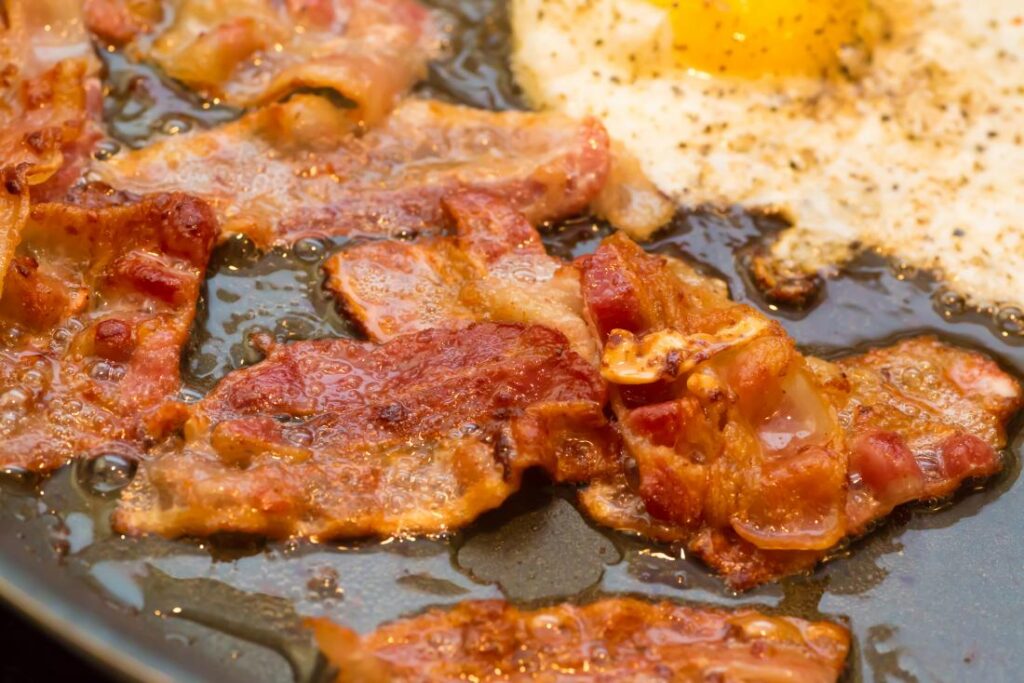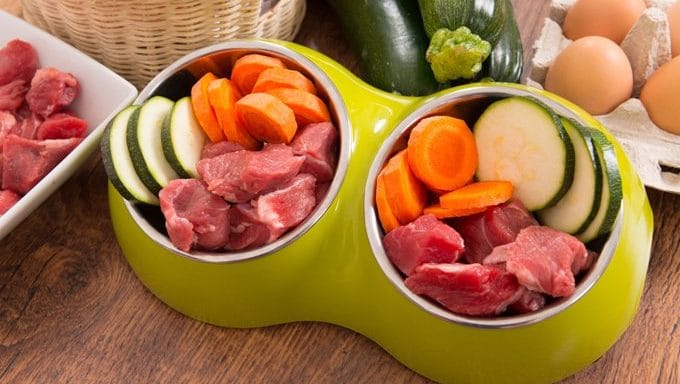Nothing prepares you for the horror of pancreatitis as a pet parent. It is worse if you are a rookie dog owner.
One funny thing with this disease is that the warning signs are not that obvious.
Often, your pup will lose his appetite or become lethargic and you’d imagine it is something less serious.
By the time you realize what you are up against, the condition will be really advanced.
Lucky for you, pancreatitis is treatable and manageable. And diet plays a key role in alleviating the disease and fastening the healing process.
In this post, we go into detail about the right food to give a dog suffering from pancreatitis.
- What Is Pancreatitis?
- Why Diet Is Important For Dogs with Pancreatitis
- What Foods Can Cause Pancreatitis In Dogs?
- Can Dogs With Pancreatitis Eat Eggs?
- Can Dogs With Pancreatitis Eat Tuna?
- Pumpkin for Dogs with Pancreatitis
- Chicken and Rice for A Dog with Pancreatitis
- Homemade Food for a Small Dog with Pancreatitis
- Final Thoughts
What Is Pancreatitis?

Pancreatitis, in simple terms, is the inflammation of the pancreas. Essentially, the pancreas is a vital organ in a dog’s body with two main functions;
- Production of digestive enzymes to break down carbohydrates, proteins, and mostly fat
- Secretion of glucagon and insulin to aid in controlling blood sugar.
Under normal circumstances, the pancreas doesn’t release enzymes until there’s a meal in the gut.
However, if the organ has issues, it will activate the enzymes which will, in turn, cause inflammation and damage to the pancreatic tissue and other organs. This is because the enzymes begin digesting the pancreas which can be quite painful to the dog.
If not treated, pancreatitis can damage the liver. Over time, the entire body will have an inflammatory response which may ultimately cause diabetes.
Pancreatitis can be either acute or chronic.
The former refers to an isolated episode of severe inflammation while the latter is a situation where the inflammation is long-standing and can go on for months or years at a time.
Common symptoms of both cases include vomiting, loss of appetite, fever, diarrhea, dehydration, abdominal pain after meals, and lethargy.
Leading causes include high-fat levels in the blood, pancreatic trauma, excessive calcium in the body, history of pancreatitis, and breed disposition.
Some of the breeds with a huge disposition to pancreatitis include Miniature poodles, Cocker Spaniels, and Miniature Schnauzers.
Why Diet Is Important For Dogs with Pancreatitis
When you suspect your pup has pancreatitis and bring them to the vet, he will undergo plenty of tests.
These include X-rays, urinalysis, a blood cell count, a blood chemistry panel, stool analyses, and an abdominal ultrasound.
After a proper diagnosis, the vet will recommend the best course of treatment.
No matter the treatment, the diet will always be the number one suggestion for managing the condition.
Getting the diet right can make or break your efforts of helping your dog recover and live a quality life despite being sick.
The idea is to reduce the work of the pancreas by offering nutrients it can process with ease. Anything that causes it to strain is considered a danger.
In most cases, a high-fat diet is a trigger for pancreatitis. That is why the holiday season always attracts many vet visits.
The high-fat junk food that is heavily consumed can be a real kicker. Yet, most well-meaning parents will bring home a fatty lamb or buttery cookies and offer them to the dog just so he can be a part of the celebrations.
Realize that the pancreas is mostly tasked with the responsibility of breaking down fats.
If you want to reduce its workload, the easiest way is to eliminate fat from the diet or at the very least, minimize it.
If you must feed fat to your dog, stay away from low-grade vegetable fats or those from unknown sources. Go for high-quality animal fat instead.
High-fiber, low-fat dog food is perfect for a dog with an inflamed pancreas as it offers good nutrition while promoting pancreatic healing. A diet that is high in fiber is easy to digest.
Protein and carbs should be moderate because the pancreas still digests them.
Keep the plant proteins to a minimum and choose meats instead.
Similarly, the less the starchy fillers (white potato, maize, white rice, and pea starch), the less work the pancreas has to do.
Related post: 10 Best High Fiber Dog Foods for Small Breeds
What Foods Can Cause Pancreatitis In Dogs?

Acute pancreatitis, as mentioned before, can be triggered by a high-fat diet.
The next time you pass by the confectionery shop and buy a ton of cookies made with margarine and butter or feed your dog hue bacon portions, don’t be surprised if you see symptoms of pancreatitis.
Foods such as fatty beef, pork, cheeseburgers, and buttery pastries will overload the pancreas. These foods prompt the pancreas to release more enzymes at a go than it normally would.
As a result, the extra enzymes will begin to digest the pancreas and cause inflammation in the process.
Not all dogs get acute pancreatitis after consuming a high-fat diet. However, it is a safer bet to keep a close check on the fat percentage of each of your pup’s meals.
If your pooch has a habit of snooping in the garbage bin for leftovers, you might want to watch his whereabouts at all times lest he binges on tons of fatty foods.
Related Posts:
12 Easy Tips to Stop Your Dog from Stealing Food off the Counter
15 Things You Probably Didn’t Know About Dogs That Eat Rocks
Can Dogs With Pancreatitis Eat Eggs?
Certainly! Eggs have fat but pack a punch in terms of nutrition.
Considering the amount of protein your pup gets, this qualifies to be a good food choice for a dog with pancreatitis.
There are dog owners that prefer extracting the egg white only just to bring down the fat percentage. That’s fine as long as you cook it to increase your dog’s biotin levels.
The yolk is fatty but offers amazing nutrients like calcium and iron. Egg yolks also have vitamins A, D, E, and K; folate; omega-3 fats; and vitamin B12.
Some of these nutrients have vital functions in the body. If you toss away the yolk, consider using supplements to help with overall health.
Here’s the truth though: eggs have zero dietary fiber.
So, eggs alone will not help a dog with an inflamed pancreas. You must add other dietary fiber-rich foods to round his nutrition.
Finally, as much as eggs are great, do not overdo it especially if you use yolks. If you do, the pancreas will be certainly overloaded.
Can Dogs With Pancreatitis Eat Tuna?
Tuna is an easily accessible and affordable food option.
One 3-ounce can of tuna contains 3 calories, 0.6 grams of fat, 16.5 grams of protein, and 0 grams of carbohydrate.
Just from these numbers, you can tell that tuna qualifies as a great food option for a dog suffering from pancreatitis.
0.6 grams of fat is less likely to elevate enzyme release from the pancreas. This means your pup can eat a moderate portion without developing any issues.
Like eggs, tuna is rich in Omega-3 fatty acids which aid a dog’s heart, immune system, and brain.
Additionally, it is high in an essential macronutrient termed ‘selenium’ which has been proven to promote thyroid function. It also provides anti-oxidant and anti-inflammatory benefits.
When using tuna, keep things simple. Avoid the temptation to add seasonings. If using a canned version, be sure to drain it to get rid of all the juice.
Pumpkin for Dogs with Pancreatitis
With its brightly-colored and nutrient-dense flesh, the pumpkin is a great food option for a dog with pancreatitis.
It is high in good fiber and water content. One cup of mashed pumpkin has 50 calories and a whopping 2.7 grams of fat.
The fat percentage is more than what a dog requires in a day but since it is soluble fiber, it causes no harm whatsoever.
Soluble fiber typically dissolves in water resulting in a highly viscous matter. This delays gastric emptying and controls blood glucose levels.
Canned pumpkin is even a better choice as it has more fiber content per serving.
The manufacturing process cooks it down and prevents it from becoming too watery hence the high density.
In short, whether fresh or cooked, pumpkin is good for a dog suffering from pancreatitis.
Related Post: How Much Pumpkin Should You Give a Dog For Constipation?
Chicken and Rice for A Dog with Pancreatitis
Chicken is white meat and is thus safe for dogs with an inflamed pancreas.
Virtually all doggie foods contain chicken as one of the ingredients. It is high in protein and low in fat.
As a matter of fact, most homeowners use cooked chicken as part of their dog’s regular diet.
Raw chicken is best but with the high risk of salmonella and infections, you are better off cooking the meat.
There are a ton of dog-safe methods of cooking chicken including boiling, grilling, roasting, and baking.
White rice is equally good for a sick dog. It is lower in fiber than brown rice but its blandness makes it great for combating pancreatitis.
Most vets actually recommend a balanced meal of chicken and white rice for a pup with diarrhea.
The starch and fiber help bind loose stools and soothe the gut.
Related Posts:
Homemade Food for a Small Dog with Pancreatitis

While there are a ton of places that sell the appropriate foods for a dog with pancreatitis, it’s a good idea to make them yourself.
It is not rocket science really. As long as you understand the basic fundamentals, you should be okay.
The main principle here is to go for low fat, moderate protein, high-fiber, and moderate to low carbs.
Since fat is the main macronutrient of concern, focus on that above everything else.
The recommended percentage of fat for a dog with an inflamed pancreas is 8-10%. This means that if your pup consumes a total of 1000 calories, he cannot exceed 30 grams of fat per day.
To know what this translates to on the plate, you have no option but to scrutinize food labels.
An egg, for example, has 5 grams of fat. If you feed your pup two eggs, it means he has consumed 10 grams. The next meal should have no more than 20 grams.
The ideal food selections here include lean meats (chicken, lean beef, buffalo, rabbit, elk and turkey).
Keep off fatty beef, duck, camel, pheasant, pork, and lamb until things get back to normal.
As said before, eggs, whitefish, and game meat are great. Feel free to mix raw bones, organs, and muscles here.
As for the fiber, utilize a bunch of cooked vegetables like asparagus, broccoli, mushrooms, Kale, Green beans, and pumpkin. The last is especially great.
Good carbs include brown rice, rye, barley, watermelon, oatmeal, and whole wheat.
Related Posts:
How to make Homemade Dog Treats with Rolled Oats
8 Best Store-Bought Bone Broth for Dogs (plus Easy Homemade Recipes)
How to Cook Sweet Potato for Dogs
How to Prepare Marrow Bones for Dogs
A Quick Guide to Choosing the Right Homemade Dog Food Ingredients
Final Thoughts
There it is; a quick guide on what to feed a dog with pancreatitis.
The short of it is that the condition can be managed to a great extent by feeding your pooch the right meals.
The best part is that you can make the meals yourself provided you know the macros on the plate.
Related Posts:
Homemade Diabetic Dog Treats: Diet Tips, Recipes & FAQ’s
Best Foods for Dogs with Allergies: Everything You Need To Know
What to Feed a Dog with Kidney Failure Who Will Not Eat
Plain Food Is No Longer Enough: 23 Vitamins and Minerals to Add To Your Homemade Dog Food
Image sources: 1
As an Amazon Associate, we may receive a small commission from qualifying purchases but at no extra cost to you. Learn more. Amazon and the Amazon logo are trademarks of Amazon.com, Inc, or its affiliates.

